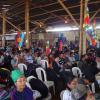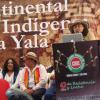The right to communicate and challenges for citizens
ALAI, Quito. With the development of new information and communication
technology (ICT), not only has the realm of communication expanded but its
importance has multiplied, due to new implications it has for different areas
of social coexistence. Never before in history has humanity been able to count
on so great a potential to communicate, and yet this is mitigated by the
increasing tendency towards the monopolization of such technologies, under the
protection of the norms imposed by the dictatorship of the market.
Under this order of things, not only have imbalances been accentuated but also
exclusion has become a structural factor, blocking the possibility of ordinary
people to make their voice heard. In fact this new gap is now referred to as
?info-rich? and ?info-poor?. Moreover, the subordination to market forces
?according to which people are only consumers and not citizens- has meant that
communication has been deprived of its social and public character, and simply
become merchandise.
In the face of this reality, it has become all the more important to claim the
human right to communicate, as a substantive element of the struggle of the
people against the dictatorship of the market, that has placed the fate of the
world in the hands of the large corporations, where the power of communication
monopolies plays a strategic role.
THE RIGHT TO COMMUNICATE
The fight for the democratization of communication has its basis in history,
inasmuch as a link has always existed between power and domination over
communication. In view of the potential abuse of this power, it has been
imperative to establish rights. In that historic process, in 1948, the
Universal Declaration of Human Rights established, in Article 19, the Right to
Information, that contemplates individual rights, such as to inform and to be
informed, freedom of opinion, protection of privacy and free access to
information, as well as institutional rights of the media, professionals, and
collective rights.
Nevertheless, with the development that has taken place in this area, the need
to take this process further emerged. Thus, the movement in favor of the
?Right to Communicate? took form, building upon a proposal launched by Jean
D?Arcy in 1969, who ten years later defined it more clearly in these terms:
?Today we see that this right encompasses all freedoms, but also, just as much
for individuals as for societies, it contributes elements of access and
participation to information and the bilateral flow of information, all
necessary notions, as we fully understand now, for the harmonious development
of man and humanity? (our translation).
Since then, the principle of the right to communicate has become enriched
through mutiple struggles and initiatives committed to the democratization of
communication.
A PROCESS IN CONSTRUCTION
Throughout this journey, the forces behind this process have been extending
beyond the groups and people involved directly in communication who defend this
cause, to gradually incorporate social and civic movements that are also
adopting it.
For example, three years ago, the ?World Human Rights Forum: Viena + 5?,
(Ottawa, June 1998), among other resolutions, agreed to urge the United Nations
Organization to ?to convene a World Conference On Communication, involving
broad participation of civil society, with the mandate to analyze the issues
and argue for the recognition of the Right to Communicate?.
A similar line was developed by the ?International Forum on Communication and
Citizenship? (San Salvador, September 1998), which stood out due to the
significant presence of representatives of social, ethnic, and civic movements.
Similarly, many other events and initiatives, of diverse magnitude and
importance, have taken place around the world.
From these efforts, coincidences have emerged, relating to the need to find
practical solutions, as well as to come together and co-ordinate around the
democratization of communication. Among the proposals that have taken shape
are the following:
- create and/or strengthen means of citizen communication and search for spaces
for interchange and collaboration among the people.
- establish bridges and convergences in order to construct a common platform
of proposals and demands.
- define crucial consensual points for intervention in the face of the powers
that be.
- take up the challenge of raising awareness among society as a whole
concerning the stakes of democratizing communication.
- guarantee the plurality of information sources and democratic access to the
radioelectric spectrum.
- develop programs of media "literacy" in order to develop critical analysis
and citizen monitoring skills
- guarantee public access to old and new technologies and the acquisition of the
skills necessary to use them
- promote a gender focus in all communicational activities
urge the media to adopt ethical codes, including respect for diversity.
The Social World Forum presents a new opportunity for seeking a consensus in
order to advance towards the consolidation of these goals.













